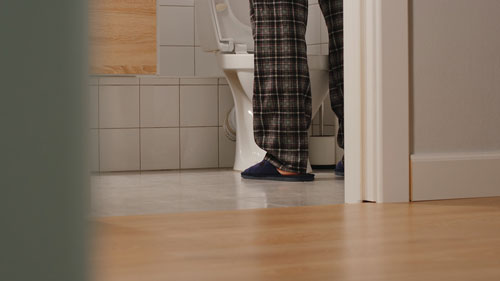Having to get up repeatedly at night to use the bathroom is more than an annoyance. It can destroy your chances for restful sleep. Of course, that means you’ll be tired and less productive during the day.
But a new study shows that nocturnal bathroom trips may signal something more serious.
The research was performed at Japan’s Tohoku Rosai Hospital. Scientists examined 3,749 subjects. Researchers took their blood pressure. And they had them track how often they urinated at night.[1]
Dr. Satoshi Konno was the study author. He said that “getting up in the night to urinate was linked to a 40% greater chance of having hypertension.” And the more bathroom visits, the greater the risk of high blood pressure.
Scientists believe that salt intake is at least partly to blame. It leads to high blood pressure and water retention, which in turn causes nighttime urination.
The Right Way to Check Your Blood Pressure
High blood pressure raises the risk of stroke, heart attack, kidney disease, and erectile dysfunction. If you’re using the bathroom at night, you’ll want to make sure your blood pressure is not the issue.[2] [3]
Here’s how to make sure you get an accurate reading whether you are at your doctor’s office or at home:
- Do: Empty your bladder before your blood pressure is taken.
- Do: Sit in a chair, feet flat on the ground, legs uncrossed, with your back supported, and without talking. Sit quietly for at least five minutes and preferably 12 minutes before you get your blood pressure measured.
- Do: Roll up your sleeve so the blood pressure cuff rests on bare skin, not clothing.
- Don’t: Exercise, consume caffeine, or smoke within 30 minutes of your test.
- Don’t: Sit or lie on the exam table. That can result in a falsely low reading.
- Don’t: Let your arm dangle or rest in your lap during the reading. It should be supported on a surface such as a desk or chair arm.
If your blood pressure is high, don’t immediately start on a medication. Instead, try meditation. Research shows it induces a relaxation response that lowers blood pressure.[4]
Yoga is one way to induce the relaxation response. The deep breathing and meditation done during yoga sessions lowers blood pressure, researchers have found.
Or you can try a simple daily relaxation technique called mindfulness meditation. It’s easy. And it’s beneficial even if you do it for only five minutes a day.
8 Steps to Mindfulness Meditation
Here’s a step-by-step guide:
Find a seat. Sit on a chair, park bench, carpeted floor—anywhere that is comfortable. You want a stable, solid seat…not a porch swing or rocking chair.
Position your legs. Many people like to cross their legs, but that’s not necessary. Sit so that you can relax.
Sit up. Straighten your upper body, but don’t be stiff. Your back has a natural curve. Let it be there.
Drop your hands. Let your hands rest naturally on your legs.
Look ahead. You can close your eyes or gaze forward without focusing on anything in particular.
Feel your breath. Pay attention to the physical act of breathing. Notice your chest and belly rise and fall. Mentally note breathing in and breathing out.
When your mind wanders… Don’t worry about it. That’s normal. Just go back to paying attention to your breathing.
Stop. Open your eyes if they were closed. Notice how your body feels. Pause for a moment to consider how you’d like to continue on with your day.
As little as five minutes a day is beneficial. But longer sessions—up to a half hour—or two or three shorter sessions a day, work well for many people.
Editor’s Note: If you’re concerned about your blood pressure, you need to read Independent Healing. It’s your best source for unbiased, evidence-based solutions to the most common health problems.
Find out more, HERE.
Related Articles
High Blood Pressure Could Save Your Life
One Miracle Mineral Stops High Blood Pressure
It Gives You High Blood Pressure…and It’s in Your Medicine Cabinet
[1]https://medicalxpress.com/news/2019-03-toilet-night-high-blood-pressure.html
[2]https://newsroom.heart.org/news/high-blood-pressure-redefined-for-first-time-in-14-years-130-is-the-new-high
[3] https://www.mayoclinic.org/diseases-conditions/high-blood-pressure/in-depth/high-blood-pressure/art-20045868
[4]https://www.bidmc.org/about-bidmc/news/relaxation-response-may-reduce-blood-pressure-by-altering-expression-of-a-set-of-genes-1

